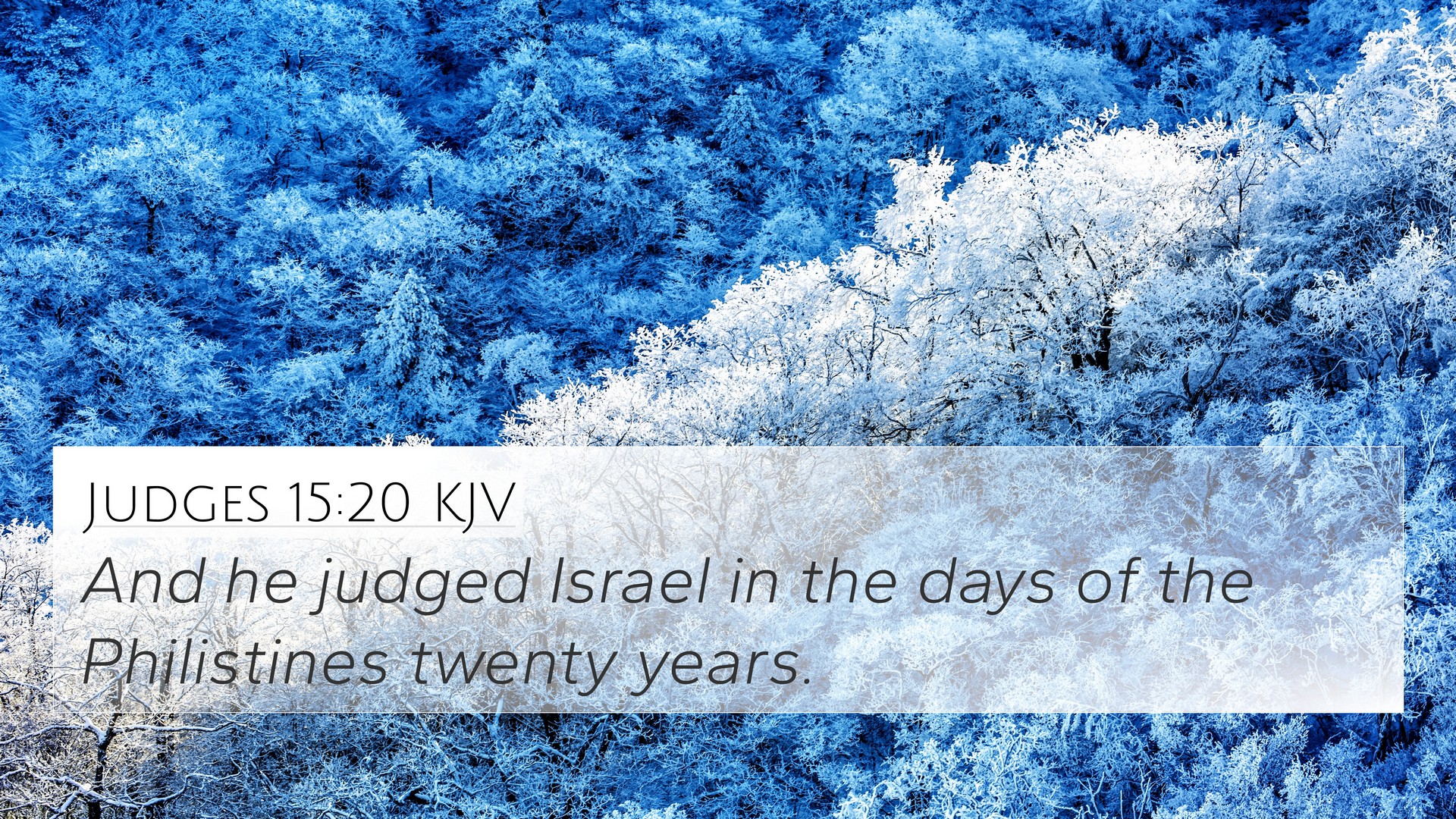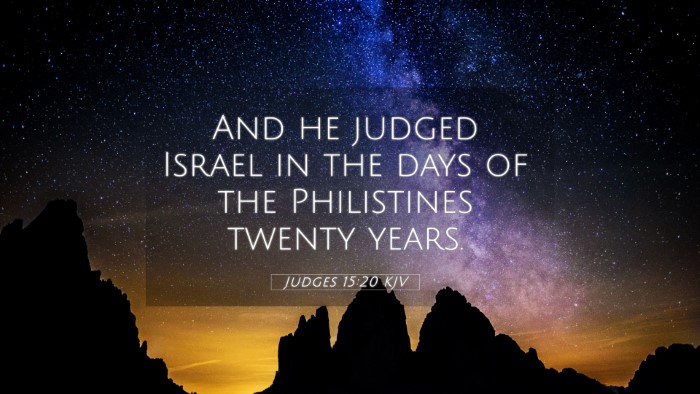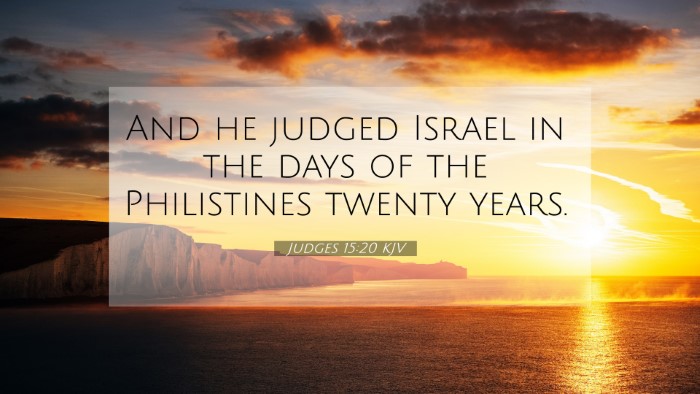Old Testament
Genesis Exodus Leviticus Numbers Deuteronomy Joshua Judges Ruth 1 Samuel 2 Samuel 1 Kings 2 Kings 1 Chronicles 2 Chronicles Ezra Nehemiah Esther Job Psalms Proverbs Ecclesiastes Song of Solomon Isaiah Jeremiah Lamentations Ezekiel Daniel Hosea Joel Amos Obadiah Jonah Micah Nahum Habakkuk Zephaniah Haggai Zechariah MalachiJudges 15:20 Similar Verses
Judges 15:20 Cross References
And he judged Israel in the days of the Philistines twenty years.
Uncover the Rich Themes and Topics of This Bible Verse
Listed below are the Bible themes associated with Judges 15:20. We invite you to explore each theme to gain deeper insights into the Scriptures.
Judges 15:20 Cross Reference Verses
This section features a detailed cross-reference designed to enrich your understanding of the Scriptures. Below, you will find carefully selected verses that echo the themes and teachings related to Judges 15:20 KJV. Click on any image to explore detailed analyses of related Bible verses and uncover deeper theological insights.
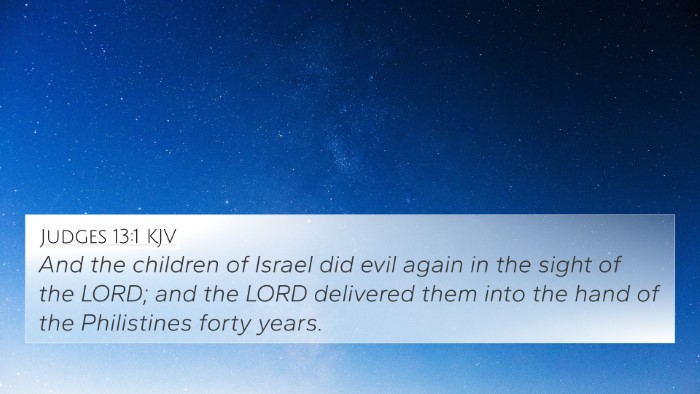
Judges 13:1 (KJV) »
And the children of Israel did evil again in the sight of the LORD; and the LORD delivered them into the hand of the Philistines forty years.
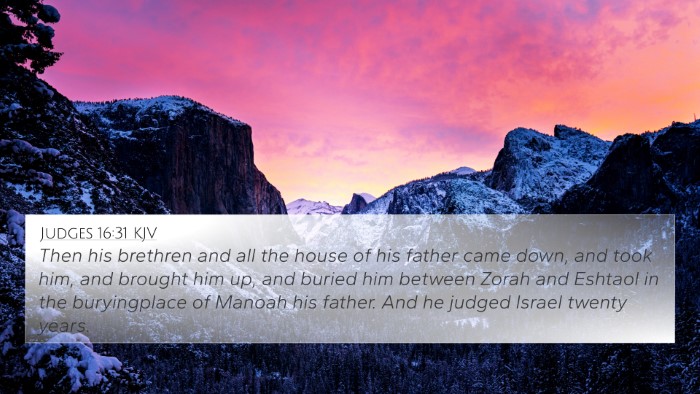
Judges 16:31 (KJV) »
Then his brethren and all the house of his father came down, and took him, and brought him up, and buried him between Zorah and Eshtaol in the buryingplace of Manoah his father. And he judged Israel twenty years.
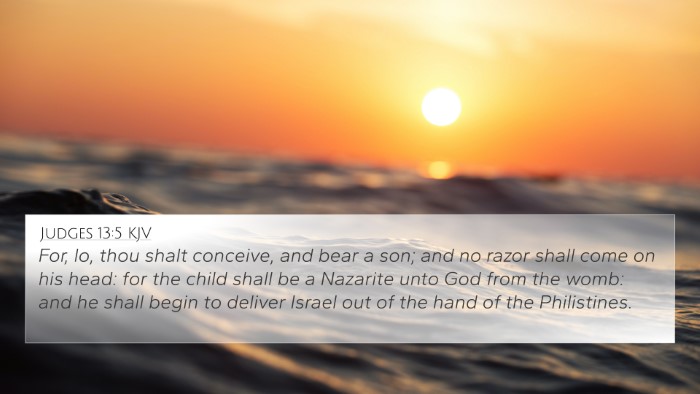
Judges 13:5 (KJV) »
For, lo, thou shalt conceive, and bear a son; and no razor shall come on his head: for the child shall be a Nazarite unto God from the womb: and he shall begin to deliver Israel out of the hand of the Philistines.
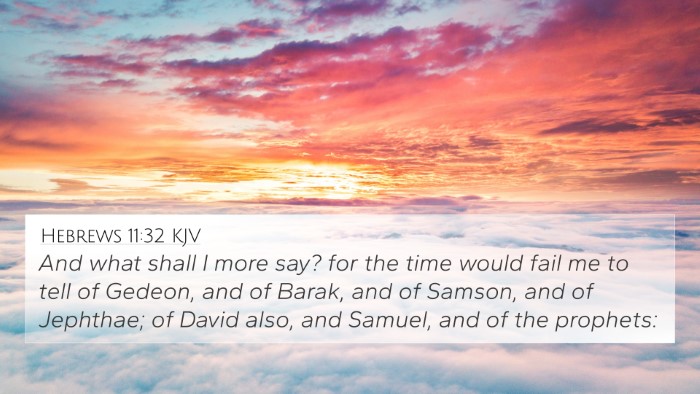
Hebrews 11:32 (KJV) »
And what shall I more say? for the time would fail me to tell of Gedeon, and of Barak, and of Samson, and of Jephthae; of David also, and Samuel, and of the prophets:
Judges 15:20 Verse Analysis and Similar Verses
Understanding Judges 15:20
Judges 15:20 states, “And he judged Israel in the days of the Philistines twenty years.” This verse concludes the narrative of Samson's life up to this point, emphasizing his role as a judge over Israel during a period of turmoil dominated by the Philistines.
Summary of Insights
Several public domain commentaries provide rich insights into this verse, illustrating its deeper meanings and cross-references with other scriptural texts.
Matthew Henry's Commentary
Matthew Henry highlights Samson as a critical figure in the narrative of the Israelites' struggle against the Philistines. He notes how Samson’s actions, while often flawed, serve a higher purpose in God’s plan for delivering Israel. Henry emphasizes that Samson's role as a judge showcases God’s mercy, allowing Israel to have a leader despite their sins.
Albert Barnes' Commentary
Albert Barnes discusses the significance of the twenty-year period mentioned in the verse. He explains that this long duration demonstrates both God's patience with His people and the moral degradation that persisted among the Israelites. Barnes posits that Samson's leadership was marked by personal conflicts and divine interventions, which were instrumental in the larger story of Israel’s deliverance.
Adam Clarke's Commentary
Adam Clarke delves into the historical context of the Philistines’ oppression and the spiritual condition of Israel during Samson's judgeship. He provides insight into how Samson's supernatural strength was a sign of God’s power, and that his role as judge symbolizes the tension between divine aid and human failure. Clarke also interprets this verse as a reminder of God’s unwavering commitment to His covenant people.
Connections and Cross-References
This verse is interconnected with several significant biblical passages. Understanding these connections further enriches the interpretation of Judges 15:20.
- Judges 14:1-4: Samson's marriage to a Philistine woman underscores the conflict between Israel and the Philistines and foreshadows his future confrontations.
- Judges 16:21-30: The final moments of Samson's life illustrate his ultimate sacrifice against the Philistines and show the fulfillment of his role as judge.
- 1 Samuel 7:2: The period following Samuel's leadership reflects similar themes of repentance and divine deliverance as seen during Samson's judgeship.
- Hebrews 11:32-34: Samson is mentioned among the heroes of faith, highlighting his significance in God’s overarching plan, despite his shortcomings.
- 1 Corinthians 1:27-29: God's choice of the weak and foolish things to shame the wise resonates with Samson’s flawed yet impactful life.
- Exodus 3:7-10: God’s concern for His people parallels the context of Samson’s judgeship, as both ensure deliverance from oppression.
- Numbers 6:1-5: The Nazirite vow details provide background on Samson’s consecration and its implications for his strength and leadership.
Thematic Connections
Judges 15:20 serves as a pivotal point that reflects broader themes in the Bible:
- Divine Sovereignty: The verse exemplifies how God’s plans often unfold through imperfect human vessels.
- God’s Mercy: The fact that Israel had a judge despite their continued disobedience illustrates God's enduring mercy.
- Conflict and Deliverance: Samson's life symbolizes the ongoing struggle between Israel and its oppressors and foreshadows future deliverances in biblical history.
- Leadership and Accountability: The complexities of Samson’s character offer lessons on the responsibilities inherent in leadership.
Conclusion
In examining Judges 15:20, we find a rich tapestry of themes and connections that extend across the biblical narrative. As seen through the insights of various commentaries, the verse not only captures a moment in Israel's history but also invites deeper reflection on the nature of God's relationship with His people.
By exploring the interconnectedness of scripture through Bible verse cross-references and thematic Bible verse connections, readers gain a more profound understanding of the biblical text. Engaging in cross-referencing Bible study methods enhances one’s insights into the Bible's unified message and helps identify Bible verses that relate to each other, thereby enriching one's spiritual journey.
